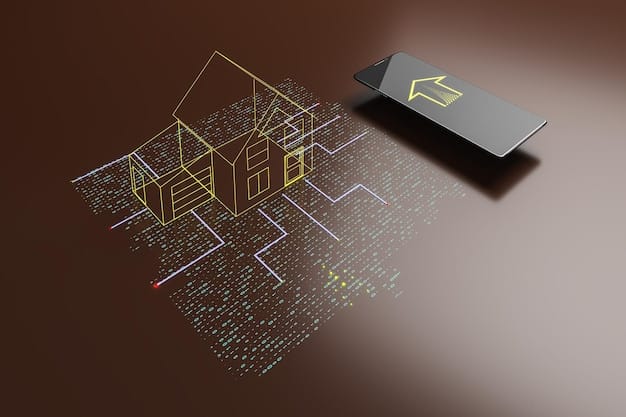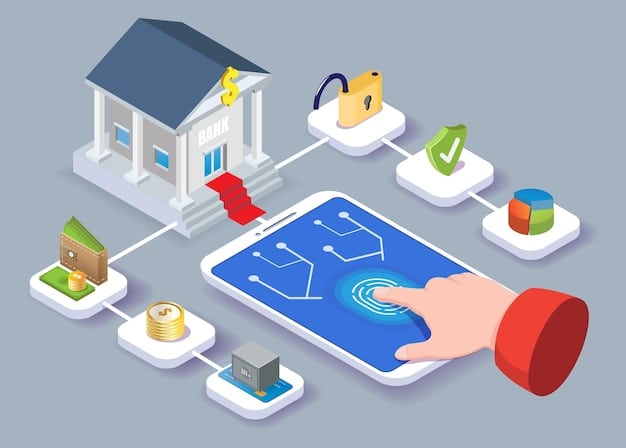Blockchain in Real Estate: Revolutionizing US Property Transactions

Blockchain in real estate is transforming property transactions in the US by enhancing security, transparency, and efficiency through decentralized, immutable ledger technology.
The integration of blockchain in real estate is poised to revolutionize how property transactions and ownership are managed in the US. This technology offers unprecedented opportunities to streamline processes, reduce costs, and increase trust in a traditionally complex industry. As we delve deeper, we’ll uncover how blockchain is not just a buzzword, but a practical solution reshaping the future of real estate.
Understanding Blockchain Technology
Blockchain technology, at its core, is a decentralized, immutable ledger that records transactions across many computers. This distributed nature means that no single entity controls the data, enhancing security and transparency. In the context of real estate, blockchain can transform various aspects of property transactions and ownership.
The fundamental principles of blockchain—decentralization, transparency, and immutability—make it an ideal solution for addressing many of the challenges plaguing the real estate sector. By understanding these core concepts, we can begin to appreciate the transformative potential of blockchain in revolutionizing property transactions.
Key Elements of Blockchain:
- Decentralization: Data is distributed across multiple nodes, reducing the risk of single points of failure.
- Transparency: All transactions are recorded on a public ledger, enhancing accountability.
- Immutability: Once a transaction is recorded, it cannot be altered, ensuring data integrity.
- Security: Cryptographic techniques secure transactions and prevent fraud.
These elements collectively create a system that is more secure, transparent, and efficient than traditional methods. The application of these principles to real estate can streamline processes, reduce costs, and foster greater trust among all parties involved.
In conclusion, grasping the underlying principles of blockchain technology is essential to understand its profound impact on the real estate industry. By providing a secure, transparent, and decentralized platform, blockchain has the potential to revolutionize how properties are bought, sold, and managed in the US.
How Blockchain Streamlines Real Estate Transactions
One of the most promising applications of blockchain in real estate is its ability to streamline transactions. Traditional real estate transactions involve multiple intermediaries, extensive paperwork, and lengthy delays. Blockchain technology can simplify these processes by providing a secure and efficient platform for recording and verifying property data.
Blockchain’s decentralized and immutable nature offers a secure and efficient platform for recording and verifying property data, ultimately reducing transaction times and costs.

From title searches to escrow services, blockchain can automate and expedite many aspects of the transaction process. This not only reduces costs but also minimizes the potential for errors and fraud.
Benefits of Streamlined Transactions:
- Reduced Paperwork: Digital documentation eliminates the need for physical paperwork.
- Faster Transactions: Automation streamlines processes, reducing transaction times.
- Lower Costs: Elimination of intermediaries reduces overall transaction costs.
- Increased Transparency: All parties have access to the same information, enhancing trust.
By leveraging blockchain, real estate transactions can become more transparent, efficient, and secure. This benefits buyers, sellers, and other stakeholders by reducing complexity and uncertainty.
In summary, blockchain’s ability to streamline real estate transactions is a game-changer, promising to reduce costs, increase transparency, and accelerate the entire process. As more industry players adopt this technology, the benefits will become increasingly apparent.
Enhancing Property Ownership with Blockchain
Property ownership is another area where blockchain in real estate can have a significant impact. Traditional methods of recording and transferring property ownership are often slow, expensive, and prone to errors. Blockchain offers a more efficient and secure way to manage property titles and ownership records.
Blockchain’s decentralized and immutable nature offers a secure and efficient platform for managing property titles and ownership records, ensuring data integrity and reducing disputes.
With blockchain, property titles can be digitized and stored on a secure, distributed ledger. This eliminates the need for physical title deeds, reducing the risk of loss, damage, or fraud. Additionally, blockchain can facilitate faster and more transparent transfers of ownership.
Advantages of Blockchain for Property Ownership:
- Secure Title Records: Digital titles are stored on a secure, immutable ledger.
- Efficient Transfers: Ownership can be transferred quickly and easily.
- Reduced Fraud: Tamper-proof records minimize the risk of fraud.
- Improved Accessibility: Ownership information is readily accessible to authorized parties.
By leveraging blockchain, property owners can enjoy greater security, transparency, and control over their assets. This can lead to increased confidence in the real estate market and a more efficient system for managing property rights.
In conclusion, blockchain’s capacity to enhance property ownership is a significant advantage, offering greater security, transparency, and efficiency in managing property titles and ownership records. This technology has the potential to transform how we think about and interact with real estate assets.
Smart Contracts in Real Estate: Automation and Efficiency
Smart contracts are self-executing contracts written in code and stored on a blockchain. They automatically enforce the terms of an agreement when certain conditions are met. In real estate, smart contracts can automate various processes, from lease agreements to property sales.
Smart contracts automate processes, reduce the need for intermediaries, and enhance the security and transparency of real estate transactions.

For example, a smart contract could be used to automatically release funds from escrow when all conditions of a sale are met. This eliminates the need for manual intervention, reducing delays and costs.
Applications of Smart Contracts in Real Estate:
- Automated Lease Agreements: Smart contracts can automate lease payments and renewals.
- Escrow Services: Funds can be automatically released when all conditions are met.
- Property Sales: Ownership can be transferred automatically upon payment.
- Property Management: Maintenance requests and payments can be managed via smart contracts.
Smart contracts offer a powerful tool for automating real estate processes, reducing the need for intermediaries, and enhancing the security and transparency of transactions. As the technology matures, we can expect to see even more innovative applications of smart contracts in the real estate industry.
In summary, smart contracts represent a significant step forward in automating and streamlining real estate processes. By reducing the need for intermediaries and ensuring transparent, secure transactions, smart contracts can bring greater efficiency and trust to the industry.
Challenges and Adoption Barriers
Despite the many benefits of blockchain in real estate, there are still challenges and barriers to its widespread adoption. These include regulatory uncertainty, technological complexity, and resistance to change from traditional industry players.
Regulatory uncertainty, technological complexity, and resistance to change from traditional industry players present significant hurdles to the widespread adoption of blockchain in real estate.
Many jurisdictions are still grappling with how to regulate blockchain technology. This lack of clarity can create uncertainty for businesses looking to adopt blockchain solutions. Additionally, the technology itself can be complex, requiring specialized knowledge and expertise.
Obstacles to Blockchain Adoption:
- Regulatory Uncertainty: Lack of clear regulations can hinder adoption.
- Technological Complexity: Understanding and implementing blockchain can be challenging.
- Resistance to Change: Traditional industry players may be resistant to new technologies.
- Scalability Issues: Some blockchain networks may struggle to handle large volumes of transactions.
Overcoming these challenges will require collaboration between industry stakeholders, regulators, and technology providers. Education and awareness are also key to promoting greater understanding and acceptance of blockchain technology.
In conclusion, while blockchain offers significant potential for transforming real estate, it is important to acknowledge and address the challenges and barriers to its adoption. By working together, industry stakeholders can pave the way for broader implementation and greater realization of the benefits of blockchain.
Future Trends and Predictions
Looking ahead, the future of blockchain in real estate appears promising. As the technology matures and adoption increases, we can expect to see even more innovative applications and greater integration into the mainstream real estate market. Several trends are likely to shape the future of blockchain in real estate.
Increased adoption, innovative applications, and greater integration into the mainstream real estate market are likely to characterize the future of blockchain.
One key trend is the development of blockchain-based real estate marketplaces. These platforms will allow buyers and sellers to connect directly, without the need for traditional intermediaries. Another trend is the use of blockchain for fractional ownership, allowing investors to purchase small portions of properties. This can make real estate investment more accessible to a wider range of people.
Emerging Trends in Blockchain Real Estate:
- Blockchain-Based Marketplaces: Direct connections between buyers and sellers.
- Fractional Ownership: Allows investors to purchase small portions of properties.
- Tokenization of Real Estate Assets: Converting properties into digital tokens.
- Decentralized Autonomous Organizations (DAOs): Managing properties through community governance.
As these trends continue to evolve, blockchain has the potential to fundamentally reshape the real estate industry. By increasing transparency, efficiency, and accessibility, blockchain can create a more level playing field for all participants.
In summary, the future of blockchain in real estate is bright, with emerging trends pointing toward greater adoption, innovative applications, and increased integration into the mainstream market. As the technology continues to evolve, it is poised to revolutionize how properties are bought, sold, and managed.
| Key Point | Brief Description |
|---|---|
| 🔑 Streamlined Transactions | Blockchain reduces paperwork and transaction times. |
| 🛡️ Enhanced Security | Immutable records minimize fraud and disputes. |
| 📜 Smart Contracts | Automate processes, reducing intermediaries. |
| 🏘️ Fractional Ownership | Allows investors to purchase portions of properties. |
FAQ
▼
Blockchain is a decentralized, immutable ledger that records transactions across many computers. This distributed nature enhances security and transparency, making it ideal for various applications.
▼
Blockchain streamlines transactions by reducing paperwork, automating processes, and eliminating intermediaries, leading to faster and more cost-effective property transactions.
▼
Smart contracts are self-executing contracts written in code and stored on a blockchain. They automatically enforce the terms of an agreement when certain conditions are met.
▼
The main challenges include regulatory uncertainty, technological complexity, resistance to change from traditional players, and scalability issues that needAddressing them will be important to ensure a better acceptance
▼
Emerging trends include blockchain-based marketplaces, fractional ownership of properties, tokenization of real estate assets, and management through Decentralized Autonomous Organizations (DAOs).
Conclusion
In conclusion, blockchain in real estate is poised to revolutionize property transactions and ownership in the US by enhancing security, transparency, and efficiency. Despite the challenges, the potential benefits are significant, paving the way for innovative applications and greater integration into the mainstream market.





